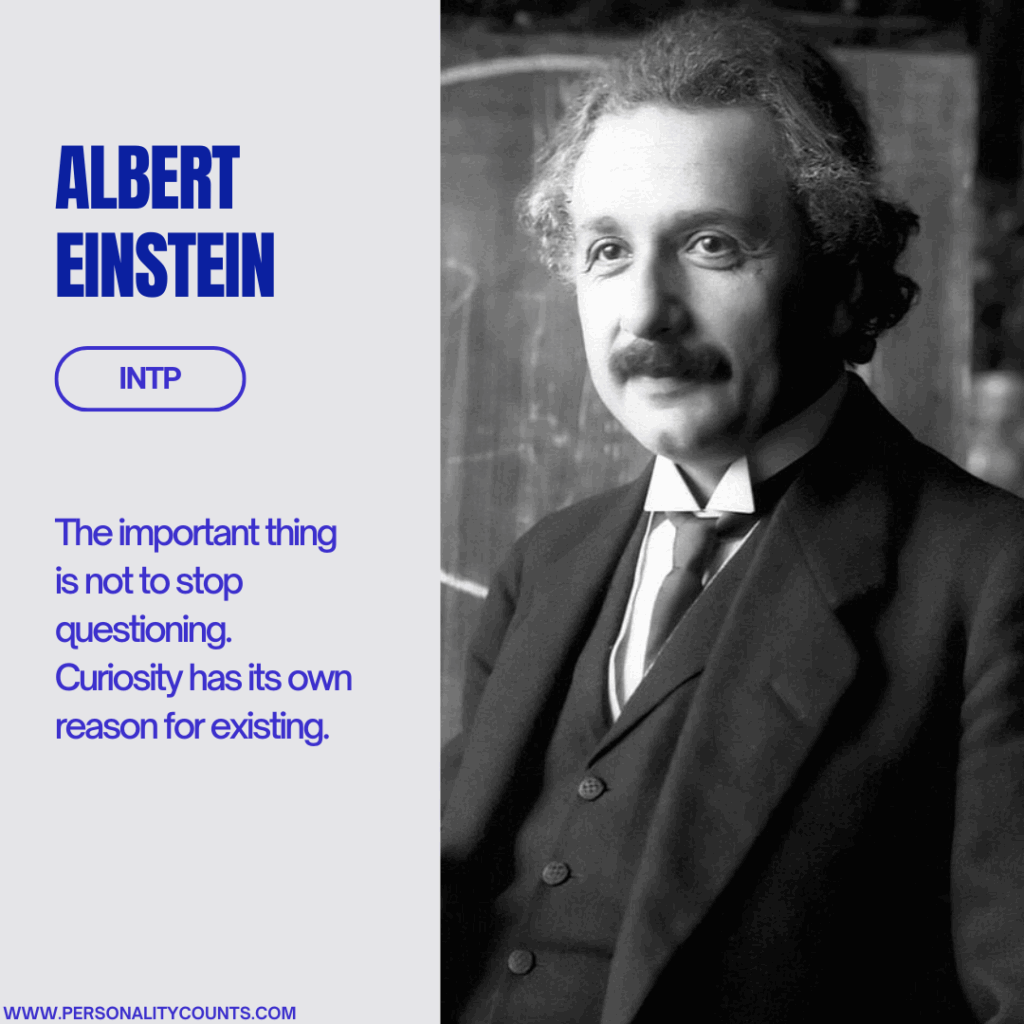
INTP
Albert Einstein is often typed as an INTP—the endlessly curious, big-picture thinker. INTPs are known for chasing ideas, questioning assumptions, and pulling apart concepts until something new emerges. Einstein’s life is a perfect example: from his childhood obsession with a compass to his revolutionary theories about light and time, he spent his life exploring questions most people didn’t even know to ask.
What makes Einstein so fascinating is that he wasn’t a straight-line genius. He was often scatterbrained, forgetful of ordinary tasks, and more at home with thought experiments than routines. But behind that absent-minded image was the sharp, analytical framework of an INTP’s cognitive functions:
- Introverted Thinking (Ti): His ability to dissect problems logically and elegantly.
- Extraverted Intuition (Ne): His endless brainstorming and imaginative leaps.
- Introverted Sensing (Si): His grounding in past theories and books he consumed.
- Extraverted Feeling (Fe): His sometimes awkward but earnest attempts to connect with others.
Early Origins and Fascinations
Einstein’s INTP traits showed up early. As a child, he became captivated by a simple compass. The invisible force pulling the needle wasn’t just interesting to him—it was life-changing. For an INTP, that kind of question (“what unseen thing drives this?”) becomes a lifelong pursuit.
Later, his fascination with the nature of light consumed him. Was light a wave? A particle? Could it be both? His curiosity became the foundation of theories that reshaped physics—and technology itself.
Einstein’s Love of Books and Philosophy
Like many INTPs, Einstein wasn’t limited to one subject. He devoured books, often philosophical ones. Immanuel Kant, himself thought to be an INTP, was a favorite. Kant’s writings on perception and reality fueled Einstein’s interest in the nature of space and time. This blend of philosophy and science shows how Ne + Ti allowed him to pull insights from multiple fields and merge them into something groundbreaking.
The Power of Thought Experiments
One of Einstein’s trademarks was the thought experiment. He didn’t need a fancy lab—his mind was the laboratory.
- As a teenager, he imagined chasing a beam of light.
- Later, he pictured observers in elevators or trains, leading him to develop relativity.
These mental simulations are classic INTP Ne at work: playing with “what if” scenarios until a new truth appears. Ti then steps in, shaping those playful musings into structured theories.
A Scatterbrained Genius
INTPs are notorious for getting lost in thought, and Einstein was no exception. He was forgetful, absent-minded, and sometimes oblivious to the details of daily life. Friends and colleagues often described him as warm yet distracted, with his mind always several steps away from the present moment. This is where Si shows up: his past reading and knowledge grounded his abstract ideas, but everyday “practical” Si tasks often fell by the wayside.
From Theories to Technology and the Nuclear Age
Einstein’s theories weren’t just abstract ideas—they laid the foundation for modern life.
- His work on light and energy directly influenced quantum mechanics.
- The equation E=mc² eventually became central to nuclear energy and weapons.
- His relativity theories are built into GPS technology we rely on daily.
This is the power of an INTP mind: ideas that start as playful experiments in imagination ripple out into inventions and technologies that shape the world.
The Human Side: Fe in Action
Einstein wasn’t always the smoothest socially, but his Extraverted Feeling (Fe) showed in his later advocacy for peace and humanitarian causes. Though he struggled with relationships at times, he cared deeply about humanity and used his platform to argue against war and for global cooperation.
Lessons from Einstein the INTP
Einstein’s story is inspiring for anyone with INTP tendencies—or anyone drawn to curiosity and creativity:
- Follow your fascinations. A simple compass sparked a lifetime of discovery.
- Value imagination. Einstein himself said, “Imagination is more important than knowledge.”
- Don’t fear scatterbrain. Sometimes a messy mind is the price of genius.
- Blend fields. Einstein’s insights came from merging science, philosophy, and imagination.
- Stay true to your values. His Fe drove him to use his fame for causes beyond himself.
Famous Quotes That Reflect His INTP Mindset
- “Imagination is more important than knowledge. For knowledge is limited, whereas imagination embraces the entire world.” – Pure Ne in action.
- “The important thing is not to stop questioning. Curiosity has its own reason for existing.” – A motto for every INTP thinker.
Closing Thoughts
Albert Einstein is more than just history’s most famous physicist—he’s a window into how an INTP mind works at its highest potential. Scatterbrained but brilliant, playful yet deeply logical, he turned thought experiments into discoveries that changed the course of science, technology, and human history. By leaning on Ti, Ne, Si, and Fe, Einstein showed how curiosity can reshape reality itself.
